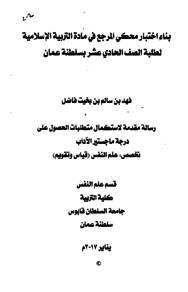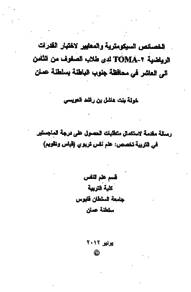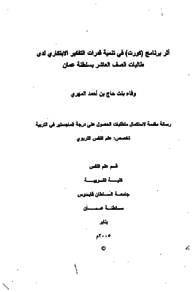Document
الخصائص السيكومترية لاختبار القدرة العددية لدول مجلس التعاون الخليجي وفق نظرية الاستجابة للمفردة : دراسة مقارنة
Publisher
جامعة السلطان قابوس
Gregorian
2018
Language
Arabic
English abstract
This study aims to compare Psychometric properties to examine the numerical ability for Gulf Cooperation Council Countries, according to the item response theory. To ensure achieving the objective of the study, the researcher used the data of numerical ability test in Gulf measurement for various mental abilities of the first and second primary grades, specifically in the sex Gulf Cooperation Council Countries; (UAE, Bahrain, Saudi Arabia, Oman, Qatar and Kuwait). This measurement contains thirty items, and the sample size contained of (4206), and the sample sizes of the GCC countries also converged. The three dimensional logistics model (3PLM) has been utilized with using MULTILOG 7.03 program to estimate the items features and overall abilities of students in the total sample and the calibrated samples. The results showed the stability of test items features estimations in general as; (discrimination, difficulty, valuation), and it must be mentioned that difficulty features had the highest level of stability. Additionally, the results showed that the frequency distribution of the students' abilities in the test was stable by the difference of calibration samples. Furthermore, the average amount of information for the calibrated samples was similar to the total sample, while the amount of information and the location of the maximum values through the connected ability were different in each sample of the calibration in the GCC Countries, and the information amount enhanced as the participant ability increase to reach the highest range at the average abilities. Whereas this range deceases at the two ends of the capacity diagram at each sample of GCC calibration samples. The researcher recommended the possibility of relying on the test of numerical capacity of the GCC countries internally in different applications because of the demonstrated degree of stability and accuracy in assessing the capabilities of individuals.
Arabic abstract
هدفت هذه الدراسة إلى مقارنة الخصائص السيكومترية لاختبار القدرة العددية لدول مجلس التعاون الخليجي وفق نظرية الاستجابة للمفردة، ولتحقيق هدف الدراسة تم استخدام بيانات اختبار القدرة العددية في مقياس الخليج للقدرات العقلية المتعددة للصفين الأول والثاني الأساسي في دول مجلس التعاون الخليجي الست (الإمارات، البحرين، السعودية، عمان، قطر، الكويت) والذي يتكون من (۳۰) مفردة، وقد بلغ حجم العينة الكلية (۶۲۰۹)، كما تقاربت أحجام عينات دول مجلس التعاون الخليجي. وقد تم استخدام البرمجية الاحصائية MULTILOG لتقدير معالم المفردات والقدرات الكلية للطلبة في العينة الكلية والعينات المعايرة وفق النموذج اللوجستي ثلاثي المعالم (3PLM). وأظهرت النتائج استقرار تقديرات معالم مفردات الاختبار بشكل عام التمييز، الصعوبة، التخمين) مع حصول معالم الصعوبة على أعلى مستوى من الاستقرار، كما أشارت النتائج إلى استقرار شكل التوزيع التكراري لقدرات الطلبة في الاختبار باختلاف العينات المعايرة، كما تشابهت متوسطات مقدار المعلومات للعينات المعايرة مع العينة الكلية، بينما اختلف مقدار المعلومات ومواقع القيم القصوى للمعلومات عبر متصل القدرة، ويتزايد مقدار المعلومات كلما زادت القدرة لتصل أكبر مدي عند القدرات المتوسطة، ويقل المدى عند طرفي متصل القدرة في كل عينة من العينات المعايرة من دول مجلس التعاون الخليجي. وأوصى الباحث بإمكانية الاعتماد على اختبار القدرة العددية لدول مجلس التعاون الخليجي داخلية في التطبيقات المختلفة لما أظهره من درجة مقبولة من الثبات والدقة في تقدير قدرات الأفراد
Description
رسالة جامعية
Member of
Resource URL
Same Subject


